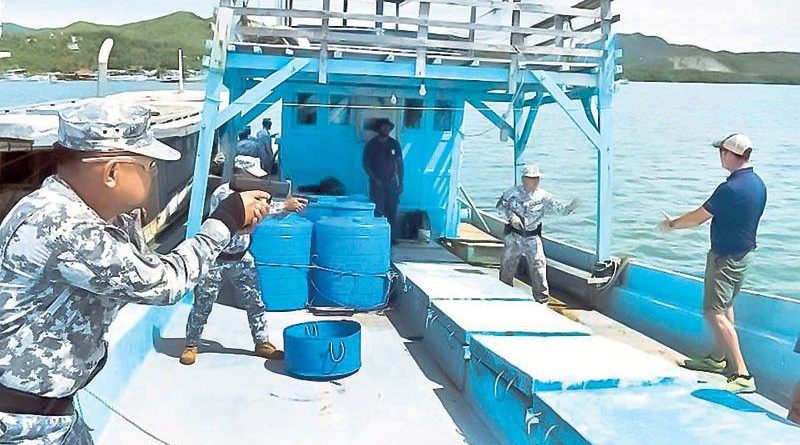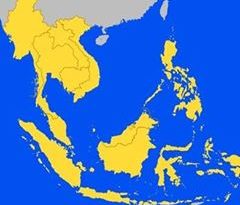HEADLINE | Philippine Coast Guard-PCG to train with US, Japan coast guards
Members of the Philippine Coast Guard’s Palawan district take part in a boarding officer’s course held at the Joint Maritime Law Enforcement Training Center in Puerto Princesa City over the weekend. They were joined by members of the PNP-Maritime Group, Malaysian Maritime Enforcement Agency, Thailand Maritime Enforcement Command Center and Vietnam Department of Fisheries and Surveillance during practical exercises focused on self-defense tactics and vessel search procedures. The PCG’s Maritime Security Law Enforcement Command, US Coast Guard and Japan Coast Guard organized the initiative.
.
.
1st trilateral maritime exercise in SCS
MANILA, Philippines — The Philippine Coast Guard (PCG) and its counterparts in the US and Japan will have their first ever trilateral maritime exercise from June 1 to 7.
The exercise, to be held in the waters of Mariveles in Bataan, would involve three PCG vessels – BRP Melchora Aquino, BRP Gabriela Silang and BRP Boracay – as well as USCGC Stratton of the US Coast Guard and the Akitsushima of the Japan Coast Guard.
The training will focus on law enforcement and on search and rescue operations, the PCG said.
The exercise will also simulate an incident of piracy involving crewmembers of a ship, to which training participants will respond.
An interception exercise involving a vessel carrying weapons of mass destruction may also be included, officials said.
“The US Coast Guard and Japan Coast Guard have been assisting us in our human resource development program, particularly in law enforcement training. This is a good opportunity to thank and show them what our personnel learned from their programs,” PCG Vice Admiral Rolando Lizor Punzalan Jr. said at a briefing.
PCG spokesman Rear Admiral Armand Balilo said the trilateral maritime exercise would be held 12 nautical miles off Mariveles, or within Philippine territorial waters. Australia would join as an observer, he said.
He pointed out there would be no border patrol training in the upcoming exercise, as it is a “routine activity among Coast Guard agencies.”
However, he said the PCG would discuss with its counterparts in US and Japan the possibility of the presence of other vessels during the drill.
The Philippines was approached by Japan and the United
States about holding joint maritime exercises in February, the
same month Manila accused China of aggressive activities in
the South China Sea, vast stretches of which Beijing claims as its territory.
“There is nothing wrong with holding exercises with your counterparts,” Balilo told a press conference.
Japan, Australia and the United States have frequently condemned China’s militarization in the South China Sea and have sought to engage closer with US ally the Philippines since Ferdinand Marcos Jr. took over as president last year from pro-China predecessor Rodrigo Duterte.
Philippine ties with the United States have gained ground under Marcos, who has been increasingly vocal about China’s conduct, including over its alleged use of a “military-grade laser” against a vessel supporting a navy food re-supply mission.
It has also complained about large numbers of suspected militia lingering near Philippine-held features in the disputed Spratly islands. China maintains the actions of its coast guard are legal and in its waters.
The PCG, meanwhile, has received donations of 246 units of caliber 9mm pistols and six units of .50 caliber heavy machine guns from the Philippine International Trading Corp. (PITC).
PCG Commandant Admiral Artemio Abu received the donation at the PCG headquarters in Port Area, Manila City last May 26.
He expressed his gratitude to PITC and its president and chief executive officer Emmie Liza Perez-Chiong for supporting the PCG’s modernization.
“(These weapons are) not only effective in combat but are necessary for our effort to deter violations of maritime law, address criminality, and enforce our sovereignty and sovereign rights,” Abu said in a statement.
“(These will also) boost morale for our troops who are reminded that the PCG leadership and the Philippine government are working to ensure they are properly equipped and protected. All the much-needed equipment provided to our troops will spell the difference between life and death,” he added.
Formal acceptance of the units coincided with the 22nd Founding Anniversary of the Deputy Chief of Coast Guard Staff for Maritime Communication, Weapons, Electronics, and Information System, CG-11, headed by CG Captain Ferdinand Montermoso.
Maritime Zone Act
Meanwhile, the House of Representatives gave an overwhelming 284 votes yesterday on a legislation that lays the groundwork for delineating the Philippines’ maritime territory.
House Bill 7819 or the Philippine Maritime Zones Act was approved on third and final reading in plenary.
“This bill will provide flexibility in enacting laws pertinent to the rights and obligations that the Philippines can exercise over its maritime zone,” Speaker Ferdinand Martin Romualdez said.
Under HB 7819, maritime zones of the Philippines comprise the internal waters, archipelagic waters, territorial sea, contiguous zone, exclusive economic zone (EEZ), and continental shelf.
Rep. Rachel Arenas of Pangasinan, chairperson of the House committee on foreign affairs who sponsored the measure at the plenary, maintained that such measure is fundamental to the national interests of the Philippines as an archipelagic state.
“We cannot defend and protect our maritime territory without declaring what is ours. We cannot pursue food and economic security without delimiting the jurisdictions of the Philippine maritime territory,” she said.
“We cannot strengthen our position in the WPS and negotiate with our neighbors if our maritime boundaries are not recognized by the community of nations. We cannot secure the future of the Filipino people if we will not enact a Maritime Zones Law,” Arenas added. –Delon Porcalla, Evelyn Macairan
.
 Ads by: Memento Maxima Digital Marketing
Ads by: Memento Maxima Digital Marketing
@[email protected]
SPACE RESERVE FOR ADVERTISTMENT



 Memento Maxima Digital Marketing
Memento Maxima Digital Marketing






